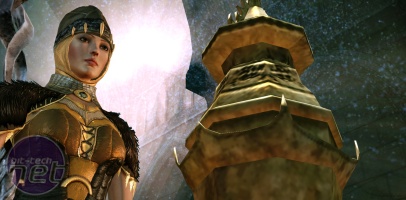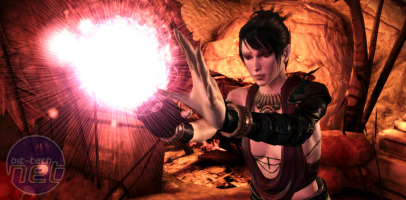
I’m playing Dragon Age: Origins in my spare time at the moment. My character is a Common Elf Rogue and I’ve had a hard time getting back into it since our review. That’s partly to do with the fact that I’m just not as enamoured with swords and sorcery as I used to be (nowadays I prefer lightspeed and lasers), but it’s also that I have a problem with the way the in-game theology is presented to players as a foregone conclusion.
I’m anxious for this not to become a real-world religious debate, but I will say that I’m an atheist and that that’s something I wanted my Elf, Jacob, to share. It seemed to make sense that a Common Elf character should be atheist too – the history of the Alienage Elves has them completely detached from their old gods and culture, while also being relegated to second-class citizens by a Chantry-led society. An Elf in an Alienage wouldn’t have grown up with the Dalish religion, but would likely have been spared the attention of the Chantry too – at least, that’s if the Origin story is anything to go by.
Dragon Age’s fictional religion obviously plays a big part of the story, with the Chantry cast as alternately oppressive and supporting of society and constantly near the centre of attention. Whether you’re helping rogue mages resist what could be seen as religious persecution or collecting ancient texts for Chantry scholars, the religion of Andastre and the Maker is pretty much unavoidable – and when it’s like that, I don’t have a problem with it. Just as in real life, I’ll let people believe what they want as long as they don’t try to make me do the same. It’s on that last, italicised clause that Dragon Age and I start to have problems…
[break]
It all started with the mission where you have to collect the ashes of the prophet Andastre from an ancient temple, with the overall aim being to use the reputed healing power of the ashes to save the life of a nobleman. I sought out the ashes with no problems or qualms, not really concerned with the religious significance of my characters actions in any real sense. In fact, I was treating the ashes not as a holy relic but as just another magic item to be collected and used.
The key word there is: magic. Ferelden is a world where magic definitely exists and is used regularly. The Chantry god though, is not. The Maker never comes down himself to give you a +2 Sword of Archdemon Slaying, he acts in mysterious ways instead. There are lots of references and legends about miracles and holy powers, but who is to say that these aren’t either natural or magical phenomenon? To me (and my character) those options seem far more likely than supposing that the Chantry’s religion is correct (and that the Elvish and Qunari religions are therefore invalid or possibly forming a larger, less possible pantheon).
All of this was unspoken though; there was no way for my character to voice this opinion upon the world, so it wasn’t something I bothered too much about. Instead, I got the magic ashes of Andastre and returned them to the Chantry scholar who had discovered the temple, Brother Genitivi.
Brother Genitivi marvelled at the ashes I had bought back with me and asked me what the experience had been like, with my available responses pretty much limited to saying that it was an incredibly holy experience or dismissing it as an errand to find a burnt woman in a stone box.
I didn’t like either of those options. My character wasn’t touched spiritually by the task and I personally had found the temple to be little more than an over-long dungeon grind with some obvious, predictable puzzles tacked on the end – so no holy revelations there. The nonchalant answer seemed even worse though, as while dismissing the ashes as nothing but ashes may have distanced my character from Chantry doctrine in some regard, it would have also passively reinforced them by confirming them as Andastre's ashes more blatantly. The line offered wasn't "I got what appear to be magic ashes while remaining unconvinced about the validity of your convictions", its "I got the most holy proof of your God, but I'm too cool to be moved by that fact."
This mediation is typical of most interactions with the Chantry throughout Dragon Age, I realised. Occasionally you get a chance to speak out against Chantry methods (such as the regulation of mages), but you’re never really given a chance to tackle the underlying theology. It's always a choice of choosing to say either "Praise the Maker!" or "The Maker exists, but I don't want to praise him right now." I want the third option which says flatly "Actually, I don't believe in the Maker and would prefer it if you just told me how many Deep Mushrooms you want me to collect and spared me the rhetoric, thanks."
For me, this is a problem because it directly affects some of the larger quests in the game. I don’t want to tell the Chantry to leave the Mage’s Circle alone for a bit; I want to tell them they have no more right to monitor the Mage’s Circle than the Dalish Elves or the Quanari. I want them to realise the hypocrisy of the situation when they, with one hand, claim that the Maker watches over all things, then with the other condemn anyone born with magical aptitude.
More importantly, I want to know why my character is apparently the only sceptic in the whole of Ferelden and why even apostate mages like Morrigan temper their hatred of the church with fear of the Maker (albeit cloaked in sarcasm). If Ferelden has room for priests, elves, mages and golems then why doesn’t it have room for sceptics and scientists too?
Read our review of Dragon Age Origins
I’m anxious for this not to become a real-world religious debate, but I will say that I’m an atheist and that that’s something I wanted my Elf, Jacob, to share. It seemed to make sense that a Common Elf character should be atheist too – the history of the Alienage Elves has them completely detached from their old gods and culture, while also being relegated to second-class citizens by a Chantry-led society. An Elf in an Alienage wouldn’t have grown up with the Dalish religion, but would likely have been spared the attention of the Chantry too – at least, that’s if the Origin story is anything to go by.
Dragon Age’s fictional religion obviously plays a big part of the story, with the Chantry cast as alternately oppressive and supporting of society and constantly near the centre of attention. Whether you’re helping rogue mages resist what could be seen as religious persecution or collecting ancient texts for Chantry scholars, the religion of Andastre and the Maker is pretty much unavoidable – and when it’s like that, I don’t have a problem with it. Just as in real life, I’ll let people believe what they want as long as they don’t try to make me do the same. It’s on that last, italicised clause that Dragon Age and I start to have problems…
[break]
It all started with the mission where you have to collect the ashes of the prophet Andastre from an ancient temple, with the overall aim being to use the reputed healing power of the ashes to save the life of a nobleman. I sought out the ashes with no problems or qualms, not really concerned with the religious significance of my characters actions in any real sense. In fact, I was treating the ashes not as a holy relic but as just another magic item to be collected and used.
The key word there is: magic. Ferelden is a world where magic definitely exists and is used regularly. The Chantry god though, is not. The Maker never comes down himself to give you a +2 Sword of Archdemon Slaying, he acts in mysterious ways instead. There are lots of references and legends about miracles and holy powers, but who is to say that these aren’t either natural or magical phenomenon? To me (and my character) those options seem far more likely than supposing that the Chantry’s religion is correct (and that the Elvish and Qunari religions are therefore invalid or possibly forming a larger, less possible pantheon).
All of this was unspoken though; there was no way for my character to voice this opinion upon the world, so it wasn’t something I bothered too much about. Instead, I got the magic ashes of Andastre and returned them to the Chantry scholar who had discovered the temple, Brother Genitivi.
Brother Genitivi marvelled at the ashes I had bought back with me and asked me what the experience had been like, with my available responses pretty much limited to saying that it was an incredibly holy experience or dismissing it as an errand to find a burnt woman in a stone box.
I didn’t like either of those options. My character wasn’t touched spiritually by the task and I personally had found the temple to be little more than an over-long dungeon grind with some obvious, predictable puzzles tacked on the end – so no holy revelations there. The nonchalant answer seemed even worse though, as while dismissing the ashes as nothing but ashes may have distanced my character from Chantry doctrine in some regard, it would have also passively reinforced them by confirming them as Andastre's ashes more blatantly. The line offered wasn't "I got what appear to be magic ashes while remaining unconvinced about the validity of your convictions", its "I got the most holy proof of your God, but I'm too cool to be moved by that fact."
This mediation is typical of most interactions with the Chantry throughout Dragon Age, I realised. Occasionally you get a chance to speak out against Chantry methods (such as the regulation of mages), but you’re never really given a chance to tackle the underlying theology. It's always a choice of choosing to say either "Praise the Maker!" or "The Maker exists, but I don't want to praise him right now." I want the third option which says flatly "Actually, I don't believe in the Maker and would prefer it if you just told me how many Deep Mushrooms you want me to collect and spared me the rhetoric, thanks."
For me, this is a problem because it directly affects some of the larger quests in the game. I don’t want to tell the Chantry to leave the Mage’s Circle alone for a bit; I want to tell them they have no more right to monitor the Mage’s Circle than the Dalish Elves or the Quanari. I want them to realise the hypocrisy of the situation when they, with one hand, claim that the Maker watches over all things, then with the other condemn anyone born with magical aptitude.
More importantly, I want to know why my character is apparently the only sceptic in the whole of Ferelden and why even apostate mages like Morrigan temper their hatred of the church with fear of the Maker (albeit cloaked in sarcasm). If Ferelden has room for priests, elves, mages and golems then why doesn’t it have room for sceptics and scientists too?
Read our review of Dragon Age Origins

MSI MPG Velox 100R Chassis Review
October 14 2021 | 15:04









Want to comment? Please log in.